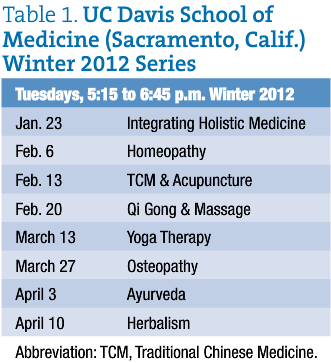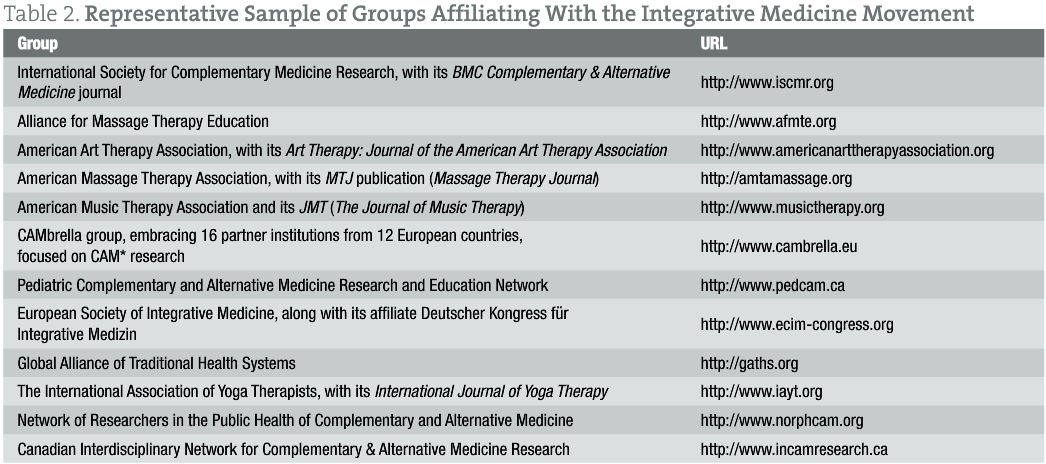Integrative Medicine: What, Me Worry?
David Schleich, PhD
The jury is still out in some quarters about whether we should be seriously concerned. There are those who contend that there are ways to avoid and even limit allopathic co-opting of naturopathic modalities and education. Several ND friends reminded me that MDs and DOs have been trying for years to scoop what naturopathic physicians do and that this latest nomenclature and activity are nothing new. They remark that the biomedicine profession can never really stop the recent development of naturopathic medical education and professional formation in any enduring way because their idea of what health is and their understanding of a relationship with the patient are both wanting. Historically, however, the allopaths have long been a worrying presence, from the days of our eclectic origins to the recent legitimizing of our agencies and support systems. Their track record is actually alarming. Whether it is the early “medical trust” (as Benedict Lust called the leadership of the MDs) or Wilk v. American Medical Association, 671 F. Supp. 1465, N.D. Illinois 1987 (the outcome of which was to slow down briefly the AMA from trying to eliminate chiropractic and osteopathic medicine) or the wretched way in which the California Medical Association blocked midwives seven times before the legalization of direct entry midwifery finally passed in 1993. We have arrived in 2012, though, educating NDs for a transforming healthcare world, and the integrated MDs are popping up everywhere, scooping our philosophy and modalities with impunity at the same time as their national and state-based voluntary medical associations remain determined to block our growth.
to eliminate chiropractic and osteopathic medicine) or the wretched way in which the California Medical Association blocked midwives seven times before the legalization of direct entry midwifery finally passed in 1993. We have arrived in 2012, though, educating NDs for a transforming healthcare world, and the integrated MDs are popping up everywhere, scooping our philosophy and modalities with impunity at the same time as their national and state-based voluntary medical associations remain determined to block our growth.
Integrative medicine, so-called, is manifesting all around us. Not only are there systematic courses emerging in allopathic medical schools (many of them initially presented as “electives”), such as the “Perspectives on Integrative Medicine” series at UC Davis School of Medicine (Sacramento, Calif.), but also there is an increasing cycle of conference and symposium gatherings of the biomedicine professionals, showcasing their recent discoveries. A winter 2012 UC Davis series (Table 1) is very telling, dabbling as it does in elements of what is familiar to NDs.
The number of conferences and symposia focused on “integrative” and “holistic” medicine is growing steadily year by year, as biomedicine and related allied health professionals focus in on evolving markets. For example, one was held in New York City in February 2012 (the most recent in a series of annual Integrative Medicine Symposia). Another is the upcoming “Integrative Medicine and Health” conference in Portland, Ore., in May, of interest to many groups in orthodox and heterodox professions. So many organizations are popping up, laying claim to healing ideas and modalities that the naturopathic profession has held the space for, for over a century, often ridiculed and attacked by the very people who are now discovering natural medicine and claiming convenient chunks. In this environment, naturopathic medical educators are finding that they not only have to be aware of a growing competitive environment within the “holistic field” but also must be wary, cautious that they do not inadvertently give away their topsoil, balancing collaboration with equality.
All sorts of primary care and allied healthcare organizations and agencies are joining the party. As we grow our naturopathic programs around the country, we have to keep the spread of integrative medicine in the dominant, allopathic biomedicine professions in mind. The competition is direct and has a usurping quality to it. The Bravewell Collaborative (http://www.bravewell.org/integrative_medicine/), for example, understands integrative medicine to be a “movement whose time has come.” Bravewell colleagues announced:
Integrative medicine is an approach to care that seeks to integrate the best of Western scientific medicine with a broader understanding of the nature of illness, healing and wellness. Easily incorporated by all medical specialties and professional disciplines, and by all health care systems, its use not only improves care for patients, it also enhances the cost-effectiveness of health care delivery for providers and payors. (http://www.bravewell.org/integrative_medicine/)
The biomedicine people in the Bravewell Collaborative further describe integrated medicine as a “practical strategy” and state that it “puts the patient at the center of the care and addresses the full range of physical, emotional, mental, social, spiritual and environmental influences that affect a person’s health” (http://www.bravewell.org/integrative_medicine/). It is alarming to read of and hear these health professionals talk about “the whole person” and about “the long-term and complex interplay between a range of biological, behavioral, psychosocial and environmental influences” (http://www.bravewell.org/integrative_medicine/).
Alarming, too, is to read what this group calls the “defining principles of integrative medicine”:
- The patient and practitioner are partners in the healing process.
- All factors that influence health, wellness and disease are taken into consideration.
- The care addresses the whole person, including body, mind, and spirit in the context of community.
- Providers use all appropriate healing sciences to facilitate the body’s innate healing response.
- Effective interventions that are natural and less invasive are used whenever possible.
- Because good medicine is based in good science, integrative medicine is inquiry-driven and open to new models of care.
- Alongside the concept of treatment, the broader concepts of health promotion and the prevention of illness are paramount.
- The care is individualized to best address the person’s unique conditions, needs and circumstances.
- Practitioners of integrative medicine exemplify its principles and commit themselves to self-exploration and self-development.
(http://www.bravewell.org/integrative_medicine/)
One would swear that this list was part of a naturopathic medical education first-year class. Where did these biomedicine people get these ideas? And why now?
Even so, there are detractors within that same landscape, despite the growth and popularity of integrative variations. Prominent allopathic leaders, such as Tom Delbanco, MD, Harvard University (Boston, Mass.), dismiss integrative medicine. Delbanco said:
I worry that people are making claims in the context of scientific medicine that they cannot really justify. I think there have been few rigorously controlled, scientifically sound studies in the area, and when they have been done, the vast majority have shown these medicines to be no different from placebo. (Kam)
Bracketing these conversations, as well, are a remarkable number of studies. Illustrative of this trend is the Integrative Medicine department at Duke University (Durham, N.C.), where Jean Kristeller, PhD, led a study called “Meditation-Based Treatment for Binge Eating Disorder,” supported by the National Institutes of Health Office of Women’s Health and National Center for Complementary and Alternative Medicine (Kristeller and Sheets, 2006). Another example is a collaboration between Dr Kristeller and Virgil Sheets, PhD, at Indiana State University (Terre Haute), involving a mindfulness-based approach to improving binge eating disorder, which was compared with a standard psychoeducation support intervention and with a waiting-list group in a randomized clinical trial.
As part of what the Bravewell Collaborative is calling an accumulating “movement,” there are numerous groups affiliating with this variation in the allopathic monopoly. Whether by association they feel strength emerging or whether they do not want to miss the boat is hard to determine at this stage. Table 2 gives a representative sample of such groups, a kind of tip of the iceberg. The sheer range, variety, and intentionality of these groups speak to momentum.

The complex interplay and cumulative effect on healthcare of these well-known organizations deserve close observation in the coming months and years to ascertain whether we have to adjust the trim tab aggressively to avoid collision with a massive biomedicine industry iceberg or not. The assimilation of key modalities, some insist, may only end up being confusing to patients, who will not have the tools to discern among the professions offering services, but who will quickly figure out the difference as we grow the profession. Thus, we have to brand ourselves very, very clearly in this emerging terrain. Naturopathic physicians have long been philosophically aligned with the principles of holism and the integrity of mind, body, and spirit. I should not worry so much. Patients know the real McCoy. More important is that we know.
 David Schleich, PhD is president and CEO of NCNM, former president of Truestar Health, and former CEO and president of CCNM, where he served from 1996 to 2003. Previous posts have included appointments as vice presi-dent academic of Niagara College, and administrative and teaching positions at St. Lawrence College, Swinburne University (Australia) and the University of Alberta. His academic credentials have been earned from the University of Western Ontario (BA), the University of Alberta (MA), Queen’s University (BEd), and the University of Toronto (PhD).
David Schleich, PhD is president and CEO of NCNM, former president of Truestar Health, and former CEO and president of CCNM, where he served from 1996 to 2003. Previous posts have included appointments as vice presi-dent academic of Niagara College, and administrative and teaching positions at St. Lawrence College, Swinburne University (Australia) and the University of Alberta. His academic credentials have been earned from the University of Western Ontario (BA), the University of Alberta (MA), Queen’s University (BEd), and the University of Toronto (PhD).
[REFERENCES]
Bravewell Collaborative. Integrative medicine. Retrieved January 24, 2012, from http://www.bravewell.org/integrative_medicine
Kam, K. What is integrative medicine? Experts explore new ways to treat the mind, body, and spirit—all at the same time. Retrieved January 2, 2012, from http://www.webmd.com/a-to-z-guides/features/alternative-medicine-integrative-medicine
Kristeller, J., & Sheets, V. (2006). Duke Integrative Medicine: Completed research studies: “Meditation-based treatment for binge eating disorder.” Retrieved January 2, 2012, from http://www.dukeintegrativemedicine.org/research/completed-research-studies









